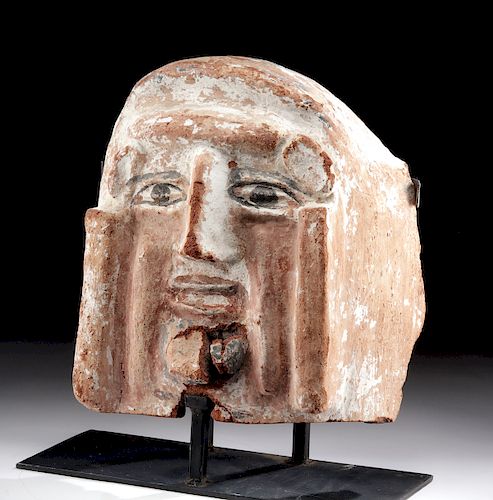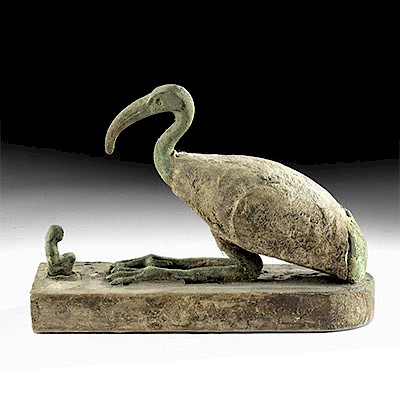Romano-Egyptian Pottery Sarcophagus Lid Fragment - Face
Lot 18b
About Seller
Artemis Fine Arts
686 S Taylor Ave, Ste 106
Louisville, CO 80027
United States
Selling antiquities, ancient and ethnographic art online since 1993, Artemis Gallery specializes in Classical Antiquities (Egyptian, Greek, Roman, Near Eastern), Asian, Pre-Columbian, African / Tribal / Oceanographic art. Our extensive inventory includes pottery, stone, metal, wood, glass and textil...Read more
Estimate:
$3,500 - $5,000
Absentee vs Live bid
Two ways to bid:
- Leave a max absentee bid and the platform will bid on your behalf up to your maximum bid during the live auction.
- Bid live during the auction and your bids will be submitted real-time to the auctioneer.
Bid Increments
| Price | Bid Increment |
|---|---|
| $0 | $25 |
| $300 | $50 |
| $1,000 | $100 |
| $2,000 | $250 |
| $5,000 | $500 |
| $10,000 | $1,000 |
| $20,000 | $2,500 |
| $50,000 | $5,000 |
| $100,000 | $10,000 |
| $200,000 | $20,000 |
About Auction
By Artemis Fine Arts
Oct 31, 2019
Set Reminder
2019-10-31 10:00:00
2019-10-31 10:00:00
America/New_York
Bidsquare
Bidsquare : Fine Antiquities, Asian, Ethnographic Art
https://www.bidsquare.com/auctions/artemis-gallery/fine-antiquities-asian-ethnographic-art-4581
Our Halloween Day auction features classical antiquities, ancient and ethnographic art from cultures encompassing the globe, plus fine art. Artemis Fine Arts info@artemisfinearts.com
Our Halloween Day auction features classical antiquities, ancient and ethnographic art from cultures encompassing the globe, plus fine art. Artemis Fine Arts info@artemisfinearts.com
- Lot Description
Egypt, Romano-Egyptian period, ca. 3rd to 4th century CE. A handsome pottery head portion from a Romano-Egyptian sarcophagus lid depicting a highly stylized human face. The expressive visage is defined by almond-shaped eyes outlined in black beneath thin eyebrows, a crested nose, thin lips parted in the center, a prominently protruding chin, deep nasolabial folds, and a broad forehead. Circular ears are presented near either temple, and the cheeks are framed with tall rectangular panels. The verso exhibits a recessed ovoid gap which would have rested atop the interior wooden coffin. Areas of original white and black pigment are still visible across the lid fragment and indicate the lid - and subsequently the rest of the sarcophagus - was at one time painted with bright colors. Size: 14.125" W x 14.5" H (35.9 cm x 36.8 cm); 17.25" H (43.8 cm) on included custom stand.
Anthropoid sarcophagi came from the Egyptian presence in the Levant during the late Bronze Age and early Iron Age, and are a unique synthesis of ideologies from the two locations. Earlier examples were formed from hardstones like granite and marble as well as hardwoods like cedar, though later dynastic periods created similar examples by employing materials like cartonnage, hardwoods, and stucco. The Egyptian aesthetic can still be seen on this example; however, the oversized features as well as the use of pottery indicate the stylization characteristic of the Romano-Egyptian period.
Provenance: private J.H. collection, Beaverton, Oregon, USA; ex-Nomis Antiquities, Van Nuys, California, USA
All items legal to buy/sell under U.S. Statute covering cultural patrimony Code 2600, CHAPTER 14, and are guaranteed to be as described or your money back.
A Certificate of Authenticity will accompany all winning bids.
We ship worldwide and handle all shipping in-house for your convenience.
#149678This is a fragment of a larger sarcophagus lid. Losses to areas of facial features, peripheries, and verso as shown. Chin repaired from three large pieces, with chips and adhesive residue along break lines. Fading to original pigmentation, abrasions in some raised areas, and stabilization to area of verso. Nice traces of original pigment across face.Condition
- Shipping Info
-
All shipping is handled in-house for your convenience. Your invoice from Artemis Gallery will include shipping calculation instructions. If in doubt, please inquire BEFORE bidding for estimated shipping costs for individual items.
-
- Buyer's Premium



 EUR
EUR CAD
CAD AUD
AUD GBP
GBP MXN
MXN HKD
HKD CNY
CNY MYR
MYR SEK
SEK SGD
SGD CHF
CHF THB
THB














